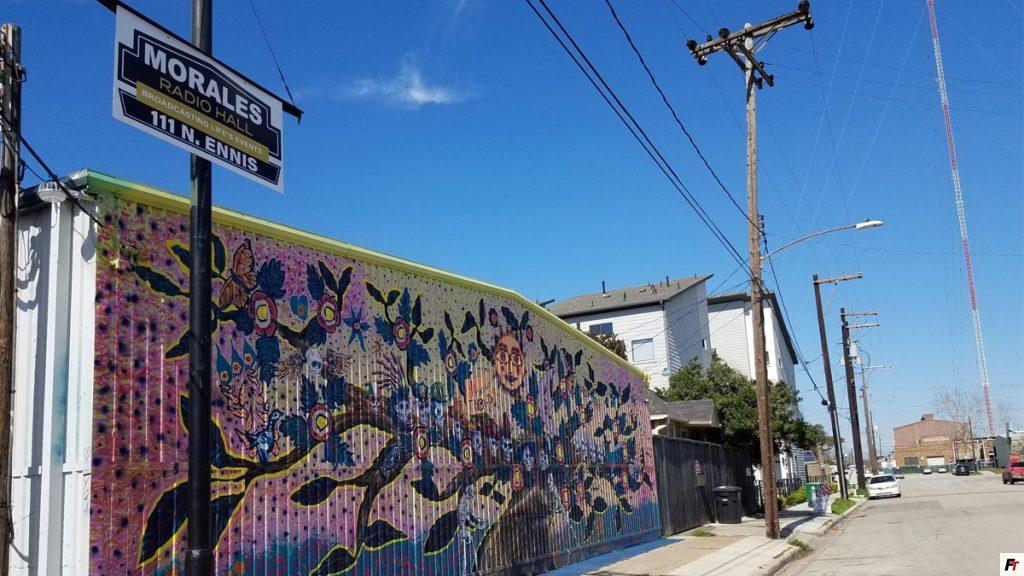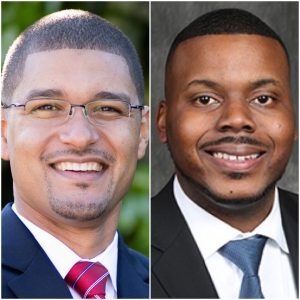#NNPA BlackPress
MOCA, Music & Mentorship at Morales Radio Hall
ABOVE: The legendary Morales Radio Hall sits in Houston’s Second Ward The City of Houston Mayor’s Office of Cultural Affairs (MOCA) develops policies and initiatives that foster an environment in which art and culture flourish. In partnership with MOCA, local musicians and historians gathered at Morales Radio Hall Aug. 30 to discuss mentorship in music. […]
The post MOCA, Music & Mentorship at Morales Radio Hall first appeared on BlackPressUSA.


ABOVE: The legendary Morales Radio Hall sits in Houston’s Second Ward
The City of Houston Mayor’s Office of Cultural Affairs (MOCA) develops policies and initiatives that foster an environment in which art and culture flourish. In partnership with MOCA, local musicians and historians gathered at Morales Radio Hall Aug. 30 to discuss mentorship in music. Equally as important as the discussion was the setting; the choice of venue is significant, as it has a long and rich history.
Felix and Angela Morales established the Morales Funeral Home in Houston, TX, in 1931. In a time when funeral homes were largely owned by whites and many Hispanic funerals occurred in garages, the Morales family broke the mold. According to their website, they were the first Hispanics to win a contract from the Harris County Commissioners Court to bury indigents. In 1942, Mrs. Morales became the first woman in Harris County to earn a mortician’s license.

Felix and Angela Morales, founders of Morales Funeral Home and Morales Radio Hall
But the couple made history in other ways when they founded Morales Radio Hall in 1946. As Morales Memorial Foundation Board Member Adrian Nieto explains: “This building served as the broadcast facility in Houston for the Houston radio station KLVL in the mid-70s to the mid-90s,” he said. “It’s historic because KLVL was the first full-time Spanish language radio station. It was established in 1950 on Cinco de Mayo by Felix and Angela Morales. Cinco de Mayo is a big holiday, mostly here in the United States, but it’s also Mrs. Morales’ birthday. So, they’re considered broadcast pioneers.”
When the station officially hit the airwaves on May 5, 1950, it was groundbreaking. Nieto shared: “Before that, the Spanish-speaking community in Houston had no information, no news. They didn’t know if there was a hurricane, that a man had landed on the moon, that the president had gotten shot. So it was a major source of news, information and entertainment.” Like the funeral home, the music hall is still standing over 70 years later.
The panel featured recording artist and Forward Times’ very own Lenora; singer-songwriter Michele Thibeaux, who has opened for luminaries like Erykah Badu and EPMD; legendary musician and drummer Jose Martinez; and Chicano music historian Isaac Rodriguez (best known as DJ Simma Down). In 2015, Rodriguez founded Tejas Got Soul, a DJ concert series highlighting Tejano music in Houston. The panel discussion doubled as a deep dive into a treasure trove of Houston music history.
Donnie Houston of the wildly popular Donnie Houston Podcast served as the panel’s moderator and asked the panelists, “How did you find your mentors – or did they find you?”
Lenora affectionately revealed “My first mentor would be my mama – I’m named after her, the OG Lenora.”
Lenora “Doll” Carter was the General Manager of Forward Times while her husband and its Founder Julius Carter served as its CEO/Publisher. But Mr. Carter died of a heart attack in 1971. “The building was bombed, presumably from running a story about things that we sadly still run today — about injustice, calling things out. My grandfather had a heart attack because of the stress of that. And my Mama took up the mantle and became the publisher of Forward Times at just 29 years old — a young widow with two young daughters running a business and never missing a beat.” Lenora was inspired by her grandmother “being a young woman boss and juggling multiple things.”

Panel moderator Donnie Houston poses with panelists Lenora, Jose Martinez, Isaac “DJ Mr. Simmer Down” Rodriguez and Michele Thibeaux (Photo by Elliot Guidry)
Michele Thibeaux recalled one late mentor who “literally pushed me – and I mean with two hands – pushed me on the stage and forced me to learn how to freestyle,” she said. “He literally made me get on the stage and sing ‘Killer Joe’ and I didn’t know it. But these musicians are looking at me like, ‘You know you got to hurry up, right?’”
“My biggest mentor was my father – and a tough one. He gave me my first break to play music,” Jose Martinez recalled. “And as I played with him, he would never really say, ‘Hey, you’re doing good.’ On the contrary, he would say: ‘I don’t think you’re ever going to make it.’ And I would say: ‘I’m gonna show him.’ And that’s what motivated me even more. Finally, a few years later, I got the pleasure of showing him ‘Hey! Here, look what I can do.’”
“I went on to play with orchestras, and they became my mentors. I learned a lot from bandleaders, ‘cause they were 30, 40, some 50 years old — and here I am, 12 and 13,” Martinez remembered. “I’m thankful for all of those who mentored me and gave me a chance.”
Isaac Rodriguez cited Gus Garza, who worked at KLVL from 1968-1971. He played a variety of Tejano music during his one-hour show, three days a week. “He had a show on KPFT (90.1 FM) called ‘Bailando en Tejas” for about 20 years. Every Saturday night, he would play old Tejano and Chicano music.” He focused on Houston, which piqued the interest of Rodriguez, a fourth-generation Houstonian. While working at KPFT, he introduced himself to Garza, whom Rodriguez credits for “schooling me on everything I needed to get me going.”
Rounding out the conversation, Donnie Houston asked how mentors inspired the panelists creatively. Lenora cited Donald Ray “DJ” Johnson Jr., known as “Beanz” of the production duo Beanz n Kornbread and one-third of popular musical trio, Khruangbin. “Beanz is a person that reminds me, in the midst of all of his personal success, that in the creative process, as well as my day-to-day life: The numbers don’t matter. Don’t look at the numbers; you’ve got to look at the impact and every chance you get, be a little more honest. I think that’s the biggest takeaway in my creative process from [Beanz] is just really focusing on impact instead of impressions,” Lenora said.
Thibeaux remembered working with a producer named Russell on a song called “Skydiving.” “For him, it was really about ‘the song comes first.’ I take that with me. No matter what song, no matter what track, no matter what instrument you are playing, just honor yourself. And when you honor yourself, you’re honoring your gift. And when you honor your gift, you’re honoring God.”

Houston Music Advisory Board Chair Jason “Flash Gordon Parks” Woods; panel moderator Donnie Houston; panelists Jose Martinez, Lenora, Isaac “DJ Mr. Simmer Down” Rodriguez, Michele Thibeaux; and Houston Music + Cultural Tourism Officer Gracie Chavez (Photo by Elliot Guidry)
When asked about meaningful ways that the panelists have returned the favor to their mentors, Rodriguez shared that he preserved their legacies by keeping their music in rotation. “These guys were making music on their own record labels. Chicanos, Mexican kids playing soul music, playing rhythm and blues, but also playing the music of their parents – conjunto and Tejano music. They’re as Texan as anything else.” (Conjunto is a Texas-based genre that employs accordion and a 12-string guitar.)
Rodriguez and his partners from Tejas Got Soul also put together a tribute to honor their legacies. “I was kind of like the record nerd that went and found them. But we got these guys back on stage after so many years. One of my mentors, Oscar Villanueva, hadn’t performed in about 40 years, and we put him back on stage right here at the Morales Radio Hall. We closed the street down and we had a big block party. And we took about three or four guys from his era and learned their songs, and we threw a concert free for the community.”
In a moment that seemed to quite literally bridge the gap, Rodriguez continued: “We gathered some of the best musicians in this network and that day we also got Archie Bell (lead singer of the legendary Archie Bell & the Drells group) to come out as a surprise guest. These guys grew up in Fifth Ward. They grew up side by side with the African American community, you know what I’m saying? So, we had to embrace that.”
In honoring and embracing their mentors, the panelists revealed themselves — along with some pivotal Houston music history.
The post MOCA, Music & Mentorship at Morales Radio Hall appeared first on Forward Times.
The post MOCA, Music & Mentorship at Morales Radio Hall first appeared on BlackPressUSA.
#NNPA BlackPress
Chavis and Bryant Lead Charge as Target Boycott Grows
BLACKPRESSUSA NEWSWIRE — Surrounded by civil rights leaders, economists, educators, and activists, Bryant declared the Black community’s power to hold corporations accountable for broken promises.

By Stacy M. Brown
BlackPressUSA.com Senior National Correspondent
Calling for continued economic action and community solidarity, Dr. Jamal H. Bryant launched the second phase of the national boycott against retail giant Target this week at New Birth Missionary Baptist Church in Atlanta. Surrounded by civil rights leaders, economists, educators, and activists, Bryant declared the Black community’s power to hold corporations accountable for broken promises. “They said they were going to invest in Black communities. They said it — not us,” Bryant told the packed sanctuary. “Now they want to break those promises quietly. That ends tonight.” The town hall marked the conclusion of Bryant’s 40-day “Target fast,” initiated on March 3 after Target pulled back its Diversity, Equity, and Inclusion (DEI) commitments. Among those was a public pledge to spend $2 billion with Black-owned businesses by 2025—a pledge Bryant said was made voluntarily in the wake of George Floyd’s murder in 2020.“No company would dare do to the Jewish or Asian communities what they’ve done to us,” Bryant said. “They think they can get away with it. But not this time.”
The evening featured voices from national movements, including civil rights icon and National Newspaper Publishers Association (NNPA) President & CEO Dr. Benjamin F. Chavis Jr., who reinforced the need for sustained consciousness and collective media engagement. The NNPA is the trade association of the 250 African American newspapers and media companies known as The Black Press of America. “On the front page of all of our papers this week will be the announcement that the boycott continues all over the United States,” said Chavis. “I would hope that everyone would subscribe to a Black newspaper, a Black-owned newspaper, subscribe to an economic development program — because the consciousness that we need has to be constantly fed.” Chavis warned against the bombardment of negativity and urged the community to stay engaged beyond single events. “You can come to an event and get that consciousness and then lose it tomorrow,” he said. “We’re bombarded with all of the disgust and hopelessness. But I believe that starting tonight, going forward, we should be more conscious about how we help one another.”
He added, “We can attain and gain a lot more ground even during this period if we turn to each other rather than turning on each other.” Other speakers included Tamika Mallory, Dr. David Johns, Dr. Rashad Richey, educator Dr. Karri Bryant, and U.S. Black Chambers President Ron Busby. Each speaker echoed Bryant’s demand that economic protests be paired with reinvestment in Black businesses and communities. “We are the moral consciousness of this country,” Bryant said. “When we move, the whole nation moves.” Sixteen-year-old William Moore Jr., the youngest attendee, captured the crowd with a challenge to reach younger generations through social media and direct engagement. “If we want to grow this movement, we have to push this narrative in a way that connects,” he said.
Dr. Johns stressed reclaiming cultural identity and resisting systems designed to keep communities uninformed and divided. “We don’t need validation from corporations. We need to teach our children who they are and support each other with love,” he said. Busby directed attendees to platforms like ByBlack.us, a digital directory of over 150,000 Black-owned businesses, encouraging them to shift their dollars from corporations like Target to Black enterprises. Bryant closed by urging the audience to register at targetfast.org, which will soon be renamed to reflect the expanding boycott movement. “They played on our sympathies in 2020. But now we know better,” Bryant said. “And now, we move.”
#NNPA BlackPress
The Department of Education is Collecting Delinquent Student Loan Debt
BLACKPRESSUSA NEWSWIRE — the Department of Education will withhold money from tax refunds and Social Security benefits, garnish federal employee wages, and withhold federal pensions from people who have defaulted on their student loan debt.

By April Ryan
Trump Targets Wages for Forgiven Student Debt
The Department of Education, which the Trump administration is working to abolish, will now serve as the collection agency for delinquent student loan debt for 5.3 million people who the administration says are delinquent and owe at least a year’s worth of student loan payments. “It is a liability to taxpayers,” says White House Press Secretary Karoline Leavitt at Tuesday’s White House Press briefing. She also emphasized the student loan federal government portfolio is “worth nearly $1.6 trillion.” The Trump administration says borrowers must repay their loans, and those in “default will face involuntary collections.” Next month, the Department of Education will withhold money from tax refunds and Social Security benefits, garnish federal employee wages, and withhold federal pensions from people who have defaulted on their student loan debt. Leavitt says “we can not “kick the can down the road” any longer.”
Much of this delinquent debt is said to have resulted from the grace period the Biden administration gave for student loan repayment. The grace period initially was set for 12 months but extended into three years, ending September 30, 2024. The Trump administration will begin collecting the delinquent payments starting May 5. Dr. Walter M. Kimbrough, president of Talladega College, told Black Press USA, “We can have that conversation about people paying their loans as long as we talk about the broader income inequality. Put everything on the table, put it on the table, and we can have a conversation.” Kimbrough asserts, “The big picture is that Black people have a fraction of wealth of white so you’re… already starting with a gap and then when you look at higher education, for example, no one talks about Black G.I.’s that didn’t get the G.I. Bill. A lot of people go to school and build wealth for their family…Black people have a fraction of wealth, so you already start with a wide gap.”
According to the Education Data Initiative, https://educationdata.org/average-time-to-repay-student-loans It takes the average borrower 20 years to pay their student loan debt. It also highlights how some professional graduates take over 45 years to repay student loans. A high-profile example of the timeline of student loan repayment is the former president and former First Lady Barack and Michelle Obama, who paid off their student loans by 2005 while in their 40s. On a related note, then-president Joe Biden spent much time haggling with progressives and Democratic leaders like Senators Elizabeth Warren and Chuck Schumer on Capitol Hill about whether and how student loan forgiveness would even happen.
#NNPA BlackPress
VIDEO: The Rev. Dr. Benjamin F. Chavis, Jr. at United Nations Permanent Forum on People of African Descent
https://youtu.be/Uy_BMKVtRVQ Excellencies: With all protocol noted and respected, I am speaking today on behalf of the Black Press of America and on behalf of the Press of People of African Descent throughout the world. I thank the Proctor Conference that helped to ensure our presence here at the Fourth Session of the […]

Excellencies:
-

 Activism3 weeks ago
Activism3 weeks agoOakland Post Endorses Barbara Lee
-

 Activism4 weeks ago
Activism4 weeks agoOakland Post: Week of March 28 – April 1, 2025
-

 Activism3 weeks ago
Activism3 weeks agoOakland Post: Week of April 2 – 8, 2025
-

 #NNPA BlackPress3 weeks ago
#NNPA BlackPress3 weeks agoTrump Profits, Black America Pays the Price
-

 Activism2 weeks ago
Activism2 weeks agoOakland Post: Week of April 9 – 15, 2025
-

 #NNPA BlackPress3 weeks ago
#NNPA BlackPress3 weeks agoHarriet Tubman Scrubbed; DEI Dismantled
-

 #NNPA BlackPress3 weeks ago
#NNPA BlackPress3 weeks agoLawmakers Greenlight Reparations Study for Descendants of Enslaved Marylanders
-

 #NNPA BlackPress3 weeks ago
#NNPA BlackPress3 weeks agoTrump Targets a Slavery Removal from the National Museum of African-American History and Culture





















































